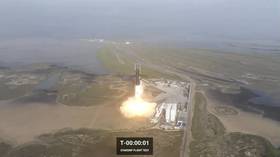Chinese firm beats Musk in space rocket race
A Beijing-based company has successfully launched the world’s first methane-powered rocket

A private Chinese aerospace firm launched the world’s first methane and liquid oxygen rocket into orbit on Wednesday, beating out global competitors, including Elon Musk’s SpaceX.
Created by LandSpace, a company based in Beijing, the rocket took off from Jiuquan Satellite Launch Center in China’s Gansu Province on Wednesday, successfully bringing a test payload into space, according to state media.
The flight lasted 750 seconds, bringing the Zhuque-2 carrier rocket into orbit around 500 kilometers (310 miles) above Earth. Dubbed ZQ-2 for short, the system is capable of carrying a maximum payload of six tonnes into low-Earth orbit and uses Tianque-12 methane and liquid oxygen engines, which are said to be safer, cheaper and more efficient than other solid or liquid fuel alternatives.
The ZQ-2 also runs cleaner, making it a good candidate for a reusable system, as the time needed to prepare and refuel the rocket is significantly reduced.
The successful test comes after a failed attempt by LandSpace in late 2022, when a technical issue with the rocket’s second stage prevented the launch.
US-based companies Relativity Space and SpaceX are also working to develop methane propulsion systems. A test carried out by Musk’s company in April ended in failure, when its Starship vehicle exploded just minutes after takeoff.
Zhang Changwu, founder and CEO of LandSpace, declared that Wednesday’s launch “has put China in the leading ranks of the global space race for methane-based rockets,” adding that his company is now preparing for another test. The CEO said LandSpace will also kick off a reusable rocket program based on the Tianque-12, aiming for a launch in 2025.
Beijing has seen major advances in its public and private space programs in recent years, with the China Manned Space Agency (CMSA) launching the first module of its Tiangong space station into orbit in 2021 and planning several more missions into 2024. The agency also hopes to send astronauts to the Moon by 2030, according to Zhang Hailian, an CMSA engineer. He said the mission will use a liquid kerosene rocket still under development, the Long March 10, which is expected to offer similar benefits to the methane system created by LandSpace.
https://www.rt.com/news/579625-china-space-rocket-technology/


0 Comments:
Post a Comment
Subscribe to Post Comments [Atom]
<< Home